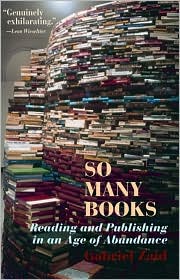April 11th, 2009 / 9:50 pm
Random
Ken Baumann
Random
Has anyone read this?
Has anyone read this book? It comes recommended by Stanley Crawford. I’m hoping to cull a concise summary from someone here so I can avoid buying it. Ahh, the irony.
Also: You can look forward to an HTMLGiant contest/giveaway. Big and soon.


now you have to read it and report here all about it.
I guess so!
I guess so!
Click my name for a picture of books I gave away recently.
TMS.
I’ve decided to only read books in my room for the next year.
Or ones I find in other “rooms”.
Click my name for a picture of books I gave away recently.
TMS.
I’ve decided to only read books in my room for the next year.
Or ones I find in other “rooms”.
Gimme gimme.
Gimme gimme.
I couldn’t finish this book. It was a waste of money.
I couldn’t finish this book. It was a waste of money.
Actually, the book itself is pretty concise. 144 small pages, very little type per page. I read it in about two hours.
Zaid makes the case that:
A) There are, mathematically speaking, far too many books to be read by any single person in his/her lifetime. And the number of books continues to increase, exponentially, every year. Like statistics? He’s got them. I think he even claims that there will soon be too many books to be read. Not enough readers, he says.
B) That this isn’t a bad thing. Books are cheap, cheaper than any other medium (television, movies, even music, radio, “the internet”) to produce and disseminate, and are then available (for reading) at any time, without any additional investment (no additional resources needed, except time– no computer, cd player, movie theater, radio, etc.). Because of this, it is perfectly okay that only a hundred people read any particular book. He even seems to think that this is a good thing, in many cases. A book ceases to have a certain cache when there are too many readers, most of whom will not read the book in any case, because the book is, more than anything, an object, a commodity, in their perspective. All those bestsellers are so much pulp waiting to be turned into grocery bags.
Actually, the book itself is pretty concise. 144 small pages, very little type per page. I read it in about two hours.
Zaid makes the case that:
A) There are, mathematically speaking, far too many books to be read by any single person in his/her lifetime. And the number of books continues to increase, exponentially, every year. Like statistics? He’s got them. I think he even claims that there will soon be too many books to be read. Not enough readers, he says.
B) That this isn’t a bad thing. Books are cheap, cheaper than any other medium (television, movies, even music, radio, “the internet”) to produce and disseminate, and are then available (for reading) at any time, without any additional investment (no additional resources needed, except time– no computer, cd player, movie theater, radio, etc.). Because of this, it is perfectly okay that only a hundred people read any particular book. He even seems to think that this is a good thing, in many cases. A book ceases to have a certain cache when there are too many readers, most of whom will not read the book in any case, because the book is, more than anything, an object, a commodity, in their perspective. All those bestsellers are so much pulp waiting to be turned into grocery bags.